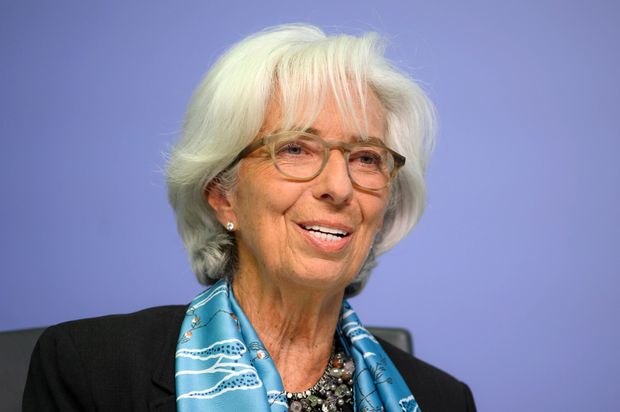
European Central Bank President Christine Lagarde at a press conference in Frankfurt on June 4.
Photo: adrian petty/Shutterstock
FRANKFURT—The European Central Bank left its large monetary stimulus unchanged Thursday, as policy makers wait to see how a resurgence in Covid-19 cases across the continent and a jump in the value of the euro might affect the region’s economy.
Europe’s economic recovery has lost momentum in recent weeks after an initial strong bounce back, and ECB officials are worried about a possible wave of job cuts and corporate bankruptcies later in the year as some state subsidies are wound down.
Many analysts expect the bank to scale up its monetary stimulus by December, especially after Federal Reserve Chairman Jerome Powell signaled last month that he is willing to allow inflation to run hotter than usual to support the labor market, a major policy shift that suggests the U.S. central bank will keep interest rates low for years. That puts pressure on the ECB to follow suit.
The ECB said in a statement that it would leave its key interest rate unchanged at minus 0.5% and continue to purchase up to 1.35 trillion euros, equivalent to $1.59 trillion, of eurozone debt under an emergency bond-buying program unveiled in March.
Recent economic data suggest that confidence among the region’s consumers and businesses is starting to wane, even though economic activity remains as much as 10% below its level at the start of the year.
In a red flag for the ECB, the region’s inflation rate plunged to minus 0.2% in August, far from the bank’s medium-term target of just below 2%.
Virus cases are surging in France and Spain, raising fears of a powerful second wave in the winter months that could trigger fresh social restrictions and hurt consumer and business confidence.
Europe’s state support programs have so far helped to keep unemployment low compared with the U.S., and businesses afloat. But some of those could soon be phased out as governments start to worry about their enormous cost.
Meanwhile, the euro has appreciated by more than 10% against the dollar in recent months, to around $1.18. That partly reflects investors’ confidence in Europe’s economic recovery and its powerful policy response to the pandemic.
But a stronger euro also tends to hurt the region’s large exporters by making their products more expensive in international markets. That hurts growth. Exporters are also wrestling with disruptions to their global supply chains, ongoing trade conflicts and uncertainty around the European Union’s future relationship with the U.K. after Brexit.
“Given that recoveries in the eurozone are often kick-started by net exports, a stronger euro could hamper any recovery going into the second half of the year and beyond,” said Carsten Brzeski, an economist with ING Bank in Frankfurt.
To address those economic threats, most analysts expect the ECB to scale up its €1.35 trillion bond-buying program by the end of the year, perhaps by €500 billion. Such a move, which aims to lower borrowing costs and support growth, would appear premature this month because the ECB has only spent about €500 billion of the total so far.
Some analysts also expect the ECB to cut its key interest rate further below zero, a move that could weaken the euro currency but might also hurt the region’s banks.
While analysts don’t expect the ECB to unveil major changes to its economic forecasts on Thursday, Ms. Lagarde is likely to stress that the bank stands ready to act swiftly if the recovery fails to perk up.
The recent slump in eurozone inflation “is not something the ECB can ignore for long without risking damage to its credibility,” said Ludovic Subran, chief economist at Allianz SE.
Write to Tom Fairless at tom.fairless@wsj.com
Copyright ©2020 Dow Jones & Company, Inc. All Rights Reserved. 87990cbe856818d5eddac44c7b1cdeb8
